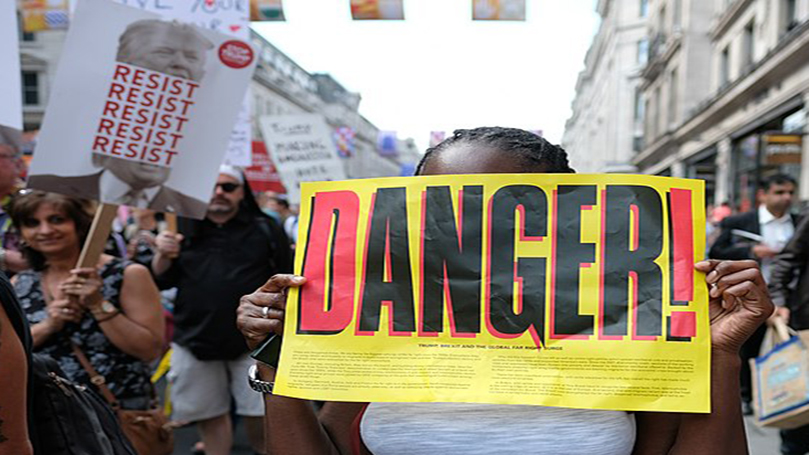
Editor’s note: This article responds to the November 2019 discussion question on political independence, working-class leadership, and the fight for democracy.
The article titled “Trump’s Impeachment,” submitted as part of the discussion around working-class leadership, makes a number of important points. The author rightly insists on the need to put a proletarian imprint on the course of political struggle. Likewise, the call to sharpen our theoretical work and produce a coherent picture of the current economic and political dynamics of capitalism is one that should be heeded. Indeed, it reflects the consensus of our recent National Convention, which prioritized the development of our theoretical work.
However, the author’s analysis is weakened by a couple of claims that, to my mind, reflect a misunderstanding of both the current political moment and the path to socialism.
[Trump] is really a centrist liberal, and maybe even in his economic policies closer to the Democrats. . . . So the function of all these dirty jokes and stupidities is to cover up that he is really a pretty ordinary, centrist politician (Slavoj Žižek).
Žižek made this claim, which the author cites approvingly, in April 2016, when Trump was emerging as a real contender for the Republican nomination. How does it hold up to history?
Most of the Trump regime’s policies directly express the demands of the most reactionary section of the capitalist class: attacks on welfare programs, labor law, regulatory agencies, collective bargaining, environmental protections, public lands, and non-discrimination law. Ideologically, these policies pursue unrestricted property rights, over and against any attempt to secure democratic rights for the poor, workers, racially and nationally oppressed people, immigrants, women, and other oppressed groups. Trump’s political orientation is visible as well in his long roster of judicial appointments, picked by the Federalist Society based on their commitment to limiting democratic rights and expanding property rights.
Like other fascist and far-right demagogues, Trump brings forth some of the problems facing the working class, including job loss and the opioid crisis, but offers solutions based on intensifying state violence, accelerating environmental destruction, and increasing workers’ dependence on capital (e.g., bribing employers to keep production in the United States).
Contrast this strategy with what is happening on the left. Organized labor is growing in both density and militancy, and movements for economic, racial, gender, and other forms of justice are reshaping both popular culture and legislative assemblies. This invigoration of the broad left has forced the liberal-democratic section of the ruling class to make some concessions, reflected in progressive legislation at the state and local levels on voting rights, wages, and other democratic issues.
[O]ne more opportunistic compromise represents one more moment of delay in the historically, objectively, and logically inevitable dissolution of the capitalist system and the development of a uniquely American form of socialism.
Socialism is not inevitable. Capitalism’s ever-sharpening crises and contradictions will not, in themselves, result in the abolition of capitalist property and the transformation of society. This revolutionary transformation is possible only as the result of a conscious, organized process of mass struggle under the leadership of a united working class.
It’s in the perspective of the movement that we can distinguish between opportunistic compromises (which lead the working class to concede power or initiative to its enemies) and revolutionary tactics (which put the working class and its allies in a stronger position to fight). Lenin, for example, signed the treaty of Brest-Litovsk and adopted the New Economic Policy because they were necessary for the development of the new Soviet state.
Like those of 1893, 1929, and 1973, the crisis of 2007 is producing a reorganization of capitalism, both economically and politically. The neoliberal framework of privatization, deregulation, austerity, and capitalist globalization has no solutions for ecological crisis, mass human displacement, growing economic inequality and insecurity, and the threat of imperialist war.
Without intervention by the people’s movement, the deepening crises of capitalism will push even liberal-democratic forces within the ruling class toward tighter limits on democratic rights, increasingly terroristic forms of capitalist power, and an elevated danger of imperialist war. The rise of the far right internationally, that is, the entry of fascist groups and fascist ideology into the mainstream of bourgeois politics, suggests the potential for such a realignment, as liberal-democratic forces within the ruling class are drawn toward “emergency measures” and “bipartisan compromises” with the reactionary right in order to secure profits.
It was precisely such a realignment after the rise of the extreme right in the 1970s and 1980s that pulled the liberal-democratic bourgeoisie toward neoliberalism. Today, the austerity regimes imposed on Greece and Puerto Rico, the easy embrace of extremists like Bolsonaro and Modi, the rightward swing on immigration by neoliberal centrists like Macron and Merkel, and bipartisan saber rattling on Russia and China all testify that another such rightward realignment is underway.
On the other hand, a broad people’s front for democracy in which the working class and its allies are the dominant political force could impose democratic solutions to the current crisis, as was done with the New Deal in the 1930s.
Medicare for All, the Green New Deal, steep cuts to military spending, civilian control of police, getting corporate money out of elections, immigration reform based on a clear and accessible path to citizenship, and protections for voting rights, organizing, and collective bargaining: any or all of these would give the working class and its allies room to breathe, space to organize, and a firm footing on which to push for more fundamental change, including socialism. These struggles are not only about achieving immediate and necessary reforms—they are the terrain on which we will build the organization and unity necessary for socialist revolution.
So Comrade Pence is correct in saying that we need to develop our theoretical work, our ability to grasp (and help others grasp) the driving forces of social change. But such development can take place only within the struggle against the Trump regime and the extreme right. As Lenin points out, “the fight against the autocracy”—and here we might substitute “fascism” for “the autocracy”—“is a temporary and transient task of the socialists, but to ignore or neglect this task in any way would be tantamount to betraying socialism and rendering a service to reaction.”
Image: Anti-Trump rally in London, July 2018, Wikimedia


 Join Now
Join Now